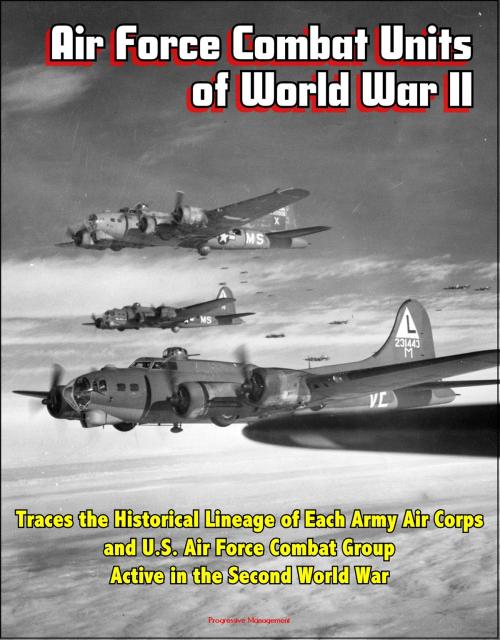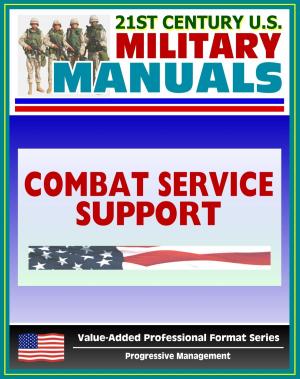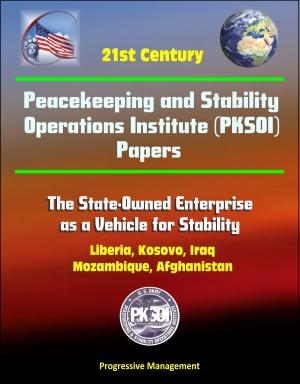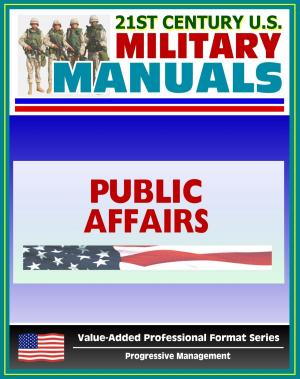Air Force Combat Units of World War II: Traces the Historical Lineage of Each Army Air Corps and U.S. Air Force Combat Group Active in the Second World War
Nonfiction, History, Military, Aviation, World War II| Author: | Progressive Management | ISBN: | 9781301285648 |
| Publisher: | Progressive Management | Publication: | December 8, 2012 |
| Imprint: | Smashwords Edition | Language: | English |
| Author: | Progressive Management |
| ISBN: | 9781301285648 |
| Publisher: | Progressive Management |
| Publication: | December 8, 2012 |
| Imprint: | Smashwords Edition |
| Language: | English |
Professionally converted for accurate flowing-text e-book format reproduction, this is an important and comprehensive historical document traces the lineage of each Army Air Corps and U.S. Air Force combat group or higher organization active in World War II, from its origins to 1956. It is a concise official record of those units: their assignments, subordinate organizations, stations, commanders, campaigns, aircraft, and decorations. But it is more than that. As an important source of ready information, this volume not only serves as a reference tool for historians and researchers; but it also provides commanders with a corporate memory of vital statistics. With these facts, a unit documents its heritage, the basis for unit esprit de corps. Originally this volume had been printed in 1961. Its worth has been proven, and the demand for it has been great. With this reprint, it will continue to serve the United States Air Force in all quarters in years to come.
Over a period of several years the USAF Historical Division has received hundreds of requests for brief histories of Air Force organizations. Air Force units ask for historical data they can use for the orientation of new personnel and for building morale and esprit de corps. USAF Headquarters and the commands need historical data for organizational planning. Information officers throughout the Air Force want historical materials for public relations purposes. Members and former members of the Air Force are interested in the units with which they have served. Government agencies and private individuals, for various reasons, seek information about Air Force units and their histories. As a result of the great demand for and the interest in such histories, it appeared that a book containing brief sketches of Air Force combat organizations would be of value as a reference work. The task of preparing such a volume was undertaken by the USAF Historical Division as a phase of its work on World War II.
Scope. This book is concerned primarily with the combat (or tactical) groups that were active during the Second World War. Although such groups had numerous designations, nearly all fell within four major categories: bombardment, fighter, reconnaissance, and troop carrier. The book covers both the combat groups that served overseas and those that remained in the United States. It also covers combat organizations above the group level. It does not deal with provisional organizations or with air base, maintenance, supply, medical, transport, and other service or support organizations.
Although this book is devoted exclusively to organizations that were active during World War II, its coverage of those organizations is not confined to the World War II period. Instead, each organization is traced back to its origin and forward to 1 January 1956, with later activations being mentioned if they took place prior to the time the draft of the book was prepared in 1957-1958.
The organizations are presented under the designations they carried on 2 September 1945. For each organization there is information concerning insigne, lineage, operations, assignments, aircraft (for groups only), components, stations, commanders, campaigns, and decorations.
Professionally converted for accurate flowing-text e-book format reproduction, this is an important and comprehensive historical document traces the lineage of each Army Air Corps and U.S. Air Force combat group or higher organization active in World War II, from its origins to 1956. It is a concise official record of those units: their assignments, subordinate organizations, stations, commanders, campaigns, aircraft, and decorations. But it is more than that. As an important source of ready information, this volume not only serves as a reference tool for historians and researchers; but it also provides commanders with a corporate memory of vital statistics. With these facts, a unit documents its heritage, the basis for unit esprit de corps. Originally this volume had been printed in 1961. Its worth has been proven, and the demand for it has been great. With this reprint, it will continue to serve the United States Air Force in all quarters in years to come.
Over a period of several years the USAF Historical Division has received hundreds of requests for brief histories of Air Force organizations. Air Force units ask for historical data they can use for the orientation of new personnel and for building morale and esprit de corps. USAF Headquarters and the commands need historical data for organizational planning. Information officers throughout the Air Force want historical materials for public relations purposes. Members and former members of the Air Force are interested in the units with which they have served. Government agencies and private individuals, for various reasons, seek information about Air Force units and their histories. As a result of the great demand for and the interest in such histories, it appeared that a book containing brief sketches of Air Force combat organizations would be of value as a reference work. The task of preparing such a volume was undertaken by the USAF Historical Division as a phase of its work on World War II.
Scope. This book is concerned primarily with the combat (or tactical) groups that were active during the Second World War. Although such groups had numerous designations, nearly all fell within four major categories: bombardment, fighter, reconnaissance, and troop carrier. The book covers both the combat groups that served overseas and those that remained in the United States. It also covers combat organizations above the group level. It does not deal with provisional organizations or with air base, maintenance, supply, medical, transport, and other service or support organizations.
Although this book is devoted exclusively to organizations that were active during World War II, its coverage of those organizations is not confined to the World War II period. Instead, each organization is traced back to its origin and forward to 1 January 1956, with later activations being mentioned if they took place prior to the time the draft of the book was prepared in 1957-1958.
The organizations are presented under the designations they carried on 2 September 1945. For each organization there is information concerning insigne, lineage, operations, assignments, aircraft (for groups only), components, stations, commanders, campaigns, and decorations.















